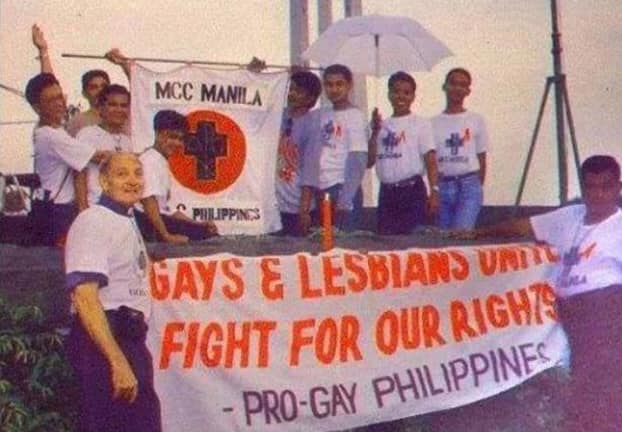Asia’s first Pride march took place on June 26, 1994, when more than 30 members of Philippine-based LGBT+ groups Progressive Organization of Gays and the Metropolitan Community Church Philippines organized a protest in Quezon City (QC) commemorating the 25th anniversary of the Stonewall Riots. QC is part of the Philippines’ National Capital Region.
Dubbed ‘Stonewall Manila’, the action was inspired by the 1969 protest in Stonewall, New York which became one of the key events that shaped the global LGBT+ liberation movement.
Two of the organizers of ‘Stonewall Manila’ shared their reflections about the protest.
Murphy Red wrote on Facebook in 2019 about the political issues they raised during the protest:
Dalawampu't limang taon na ang nakalilipas ngayong araw, bilang pag-alala sa ika-25 anibersaryo ng pag-aalsang Stonewall sa New York, USA, nagpasya kami, mga lesbyana, bakla, bisekswal, transgenders at mga kaibigang heterosekswal, na isigaw sa lansangan ang dindaranas na sistematikong diskriminasyon, karahasan, pang-aapi at pagsasamantala.
Sa naturang kilos-protesta noong Hunyo 26, 1994 na tinawag naming “Stonewall Manila,” sa dahilang hindi hiwalay ang pakikibaka ng LGBTQ sa pakikibaka ng mamamayan, isinigaw din namin ang iba pang pabor sa kapitalista at kontra-mamamayang mga patakaran ng Estado na nagpapahirap sa aming hanay at sa buong sambayanan.
Twenty-five years have passed since we – lesbians, gays, bisexual, transgenders, and heterosexual friends, – decided to commemorate the 25th anniversary of the Stonewall uprising in New York, USA, by shouting in the streets against the systematic discrimination, violence, and oppression which we are experiencing.
During the protest on June 26, 1994 which we called “Stonewall Manila”, we also protested against the pro-capitalist and anti-people policies of the state that made our lives and the lives of fellow Filipinos more miserable; because the struggles of the LGBTQ are not separate from the people’s struggle.
A year later, activist LGBT+ group Bahaghari wrote on Twitter:
In 1994, Pro-Gay—a national democratic organization of queer individuals in the Philippines—and MCCP, organized the very first Pride March in the Philippines, and in the entire Asia-Pacific.
It was dubbed Stonewall Manila, in honor of the Stonewall Riots exactly 25 years prior. pic.twitter.com/rv4PHAxdFj
— Bahaghari ?? ?⚧#TransLivesMatter (@Bahaghari_PH) October 31, 2020
Edgardo Tolosa, another organizer of ‘Stonewall Manila’, also wrote on Facebook in 2020 about how the Pride protest astounded the public, especially the police.
Sa kabila ng banta at pananakot ng PNP na huhulihin ang mga lalahok sa kilos Protesta, magiting na nagmartsa Mula Quezon Avenue patungong Quezon Memorial Circle ang mga LGBT upang ipaglaban ang Karapatan bilang Bakla at Tomboy.
Despite threats and PNP [police] warning of arrests against those who will join the protest, the LGBT bravely marched from Quezon Avenue to Quezon Memorial Circle to fight for gay and lesbian rights.
Tolosa added in a Facebook message sent to this author in June 2020 that the first Pride in 1994 articulated the everyday concerns of ordinary citizens:
Ang inspirasyon namin sa paglulungsad ng 1st gay Political Pride March ay Ang Pakikibaka ng Mamamayang Pilipino na baguhin Ang Bulok na sistema ng lipunan, tumindig at lumaban sa mga batayang isyu Ng mga LGBT na diskriminasyon, dahas at pagkakakilanlan. At Hindi hiwalay Ang LGBT sa isyu ng Mamamayan dahil apektado rin ang mga LGBT Lalo na Ang mga mahihirap na LGBT sa mga isyu tulad Ng VAT, oil price increase, demolition, natl ID system, tuition fee increase, poor health system, job opportunity atbp.
Our inspiration in launching the first gay political Pride march was the struggle of the Filipino people to change the rotten system in society, rise up and fight for our identity and the basic rights of the LGBT against discrimination, and violence. LGBT issues are not separate from the issues affecting the masses because the LGBT, especially those who are poor, are also burdened by Value Added Tax [increase], oil price increase, demolition [of homes], national ID system, tuition increase, poor health system, job opportunity [losses].
A local news report featuring the 1994 action can be accessed on YouTube. It covered the protest organized by LGBT+ groups and leaders, which was unprecedented during that time, especially in a country with a Catholic-majority population.
STONEWALL MANILA: First Gay Pride March in the Philippines and Asia-Pacific
On June 26 of 1994, 30 brave gays and a lesbian marched in the streets of Quezon City in Metro Manila, Philippines to commemorate the 25th Anniversary of… https://t.co/2eSSQoPy8n
— MurphySCRed #OustDuterteNow (@MurphySCRed) June 13, 2019
After young Pride protesters were arrested in June 2020, Red and Tolosa issued a statement in support of the LGBT+ activists:
Twenty-six years after Stonewall Manila, nothing substantially changed for the LGBTQ+; the same old systemic discrimination and homophobia remain, the same unjust structures persist. Things turned to worse however when [President] Duterte took power and foul-mouthed things into nothing better than jokes.
Tolosa concluded their Facebook post with a message addressed to the new generation of Pride participants:
Ipagpatuloy ninyo ang sinimulan ng unang pampulitikang pagkilos noong June 26, 1994
Hindi pa tapos ang pakikibaka ng mga LGBT laban sa Diskriminasyon, pagka-alipin, kahirapan ng buhay at iba pang batayang karapatan.
Ang paglaya ng LGBT ay kasabay ng ganap na paglaya ng mamamayang Pilipino.
Continue what the June 26, 1994 political action started.
The LGBT struggle against discrimination, oppression, poverty, and human rights violations is still unfinished.
The LGBT liberation will take place together with the liberation of the Filipino people.
After 1994, Pride became an annual gathering to promote LGBT+ rights. In 2019, the Pride event in Manila was attended by 70,000 people.







